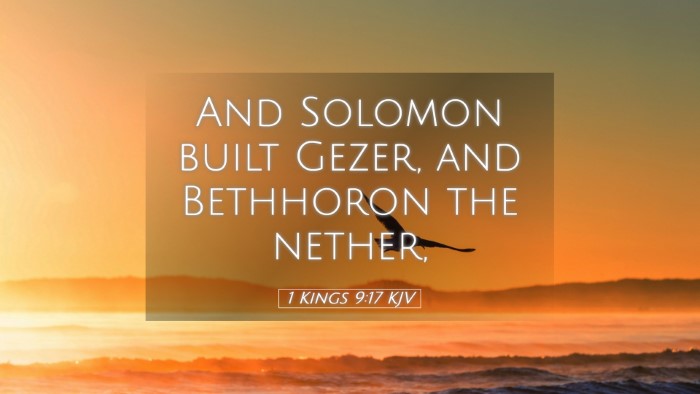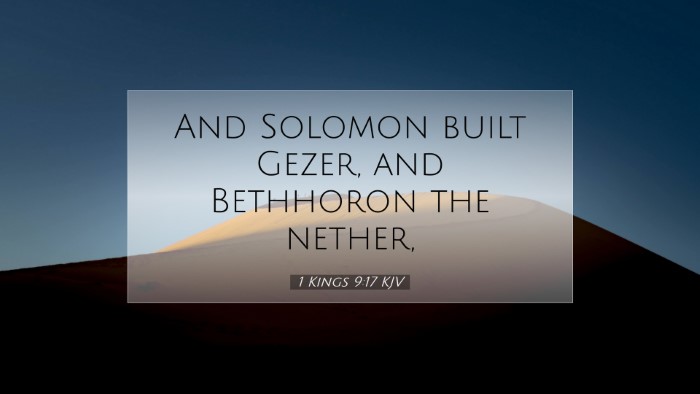Commentary on 1 Kings 9:17
Verse Context: 1 Kings 9:17 states, "And Solomon built Gezer, and Beth-horon the nether." This verse plays a crucial role in understanding the expansionist and fortification strategies of Solomon's reign over Israel.
Historical Background
In the broader context of the histories recorded in 1 Kings, Solomon's reign signifies a pinnacle in Israel’s political and territorial power. The building projects undertaken by Solomon are more than mere constructs; they represent the King’s authority and the stability he sought to establish in his kingdom.
Gezer was given to Solomon as a dowry from Pharaoh (1 Kings 9:16), and by constructing a fortified city there, Solomon was reinforcing the southern borders of Israel. Beth-horon the nether served as an important transit point, linking various regions and allowing control over trade routes.
Theological Implications
The actions of Solomon in building Gezer and Beth-horon can be seen as fulfilling the covenant promises made to the Israelites regarding their possession of the land. The fortifications symbolize God’s protection and establishment of Israel in the Promised Land.
Through Solomon’s endeavors, not only was there a physical strengthening of the nation, but also a spiritual affirmation that God was with Israel during this time of peace and prosperity. This reflects an important theological understanding that God enables His people to achieve their purposes when they align with His will.
Commentary Insights
- Matthew Henry: Henry emphasizes the significance of these cities in securing peace and stability within the kingdom. He reflects that building such fortified cities reveals Solomon's prudence and foresight, preparing the nation against potential invasions and showing a particular concern for the safety of his people.
- Albert Barnes: Barnes notes that the mention of Gezer and Beth-horon establishes Solomon's commitment to enhancing the nation's defense. He points out that these cities provide crucial strategic advantages that allow Solomon to assert dominion and maintain order throughout the territory.
- Adam Clarke: Clarke connects the construction of these cities to the fulfillment of historical prophecies and declarations made earlier in the Scriptures. He observes that the building of Gezer, originally a city of the Canaanites, signifies a critical transformation whereby the land promised to Israel is being taken, cultivated, and secured for God’s people.
Lessons for Today
The account of Solomon's building efforts teaches modern readers about the importance of leadership that is committed to the welfare of the community. It calls for current leaders within churches and organizations to invest time and resources into building foundations that promote spiritual and communal growth.
In a broader sense, this passage challenges believers to reflect on how their lives and actions contribute to the cultivation of faith and security in their spiritual communities.
Conclusion
1 Kings 9:17, while a brief record of construction, encapsulates the significant themes of leadership, divine promise, and national identity that permeate the historical books of the Bible. Through the insights from various commentaries, the application of this verse extends far beyond its immediate context, offering valuable lessons on diligence, foresight, and reliance on God for security and guidance in the life of believers.


